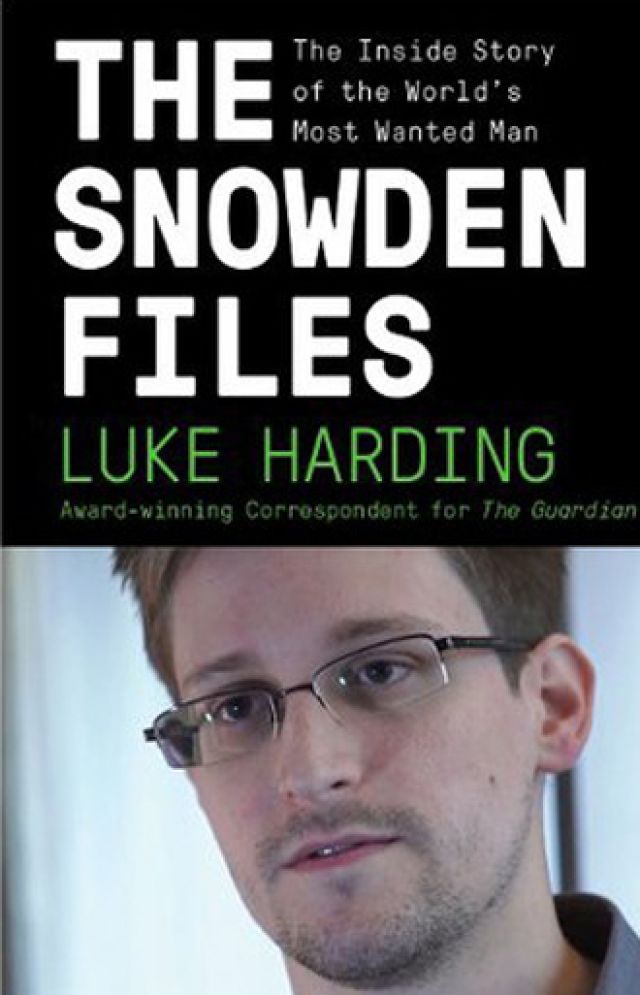
The Snowden Files
Luke Harding
Random House
February 2014
352 pages, $30
Luke Harding's The Snowden Files is a well-constructed overview of the biggest intelligence leak in history - but it is not without its flaws.
The Guardian journalist tells a detailed story of Edward Snowden - from his childhood in a military, Republican family, his short education and brief, failed army career, to his meteoric rise through the intelligence services that eventually enabled him to turn whistleblower.
It's an intriguing tale. Far from being a left-wing radical, Snowden is a staunch supporter of libertarian politician Ron Paul, "whose views are well to the right of many Republicans", as Harding puts it. Snowden acted out of a sense of patriotic duty to the US constitution and his outrage at it being repeatedly violated by a government in love with its technological advantage over other nations.
Harding's book is a real page-turner and he tells the story from many angles - but a glaringly absent voice is that of Snowden. Readers may get the feeling that - as with Harding's previous book on WikiLeaks' Julian Assange - he has rushed the book out to beat the protagonist to the chase.
Harding seems unable to help himself from making repeated digs at Assange along the way. The most unforgivable is his criticism that Assange is reckless because "six months after the first stories appeared based on US diplomatic cables, Julian Assange released the entire un-redacted cache of documents". Harding fails to mention that Assange released the cache only because the encryption key had been published without his approval - in Harding's book.
Readers may also balk at Harding's use of pejorative adjectives, so typical of the corporate media. China is "communist China", Russia is "Vladimir Putin's Russia" and Assange is the "self-styled" editor-in-chief of WikiLeaks. Similarly, Bolivia's president Evo Morales is "an indigenous Indian, who had struggled to read his inauguration speech".
There are also moments of corporate media pretension and smugness that may turn the stomach. Harding notes that the New York Times's cafeteria "hums" with "intelligent chatter". When he writes about Guardian editor-in-chief Alan Rusbridger taking a break from the Snowden investigation at a crucial point, he says: "Rusbridger himself was due to go off to his regular summer ‘piano camp’ in the Lot Valley in central France. He had recently published a book entitled 'Play it Again', an account of how he had combined demanding editing duties and the WikiLeaks story with learning Chopin’s most exacting work, ‘Ballade No. 1’... Rusbridger decided he might as well still go, despite all the dramas. He boarded the Eurostar train bound for Bordeaux. At first it was hard to concentrate on music. Soon, however, he immersed himself completely in Debussy."
This and similarly excruciating passages about Rusbridger may leave readers wondering whether Harding is praising his boss or taking the piss out of him.
All this does not mean Harding's book should be avoided. It is well-researched, well-written and he makes plenty of salient points. "[T]he Snowden files show that the NSA [National Security Agency] cheated," he writes.
"Despite the political defeat on back doors, the agency simply went ahead and secretly introduced ‘trapdoors’ into commercial encryption software used by millions of people... By inserting deliberate weaknesses into encryption systems, the agency has made those systems exploitable. Not just by government agencies, who may be acting with good intentions, but by anybody who can get hold of encryption keys – such as hackers or hostile intelligence agencies. Paradoxically, in its quest to make Americans more secure, the NSA has made American communications less secure; it has undermined the safety of the entire internet."
However, readers may wish to wait instead for Snowden to write his own book. After all, Harding quotes the documentary maker who Snowden first contacted, Laura Poitras, as saying the whistleblower is "an amazing writer". "His emails were good," says Poitras. "Everything I got read like a thriller." Buying a book written by Snowden would also mean your money would probably be funding the whistleblower's legal fees, rather than Harding's Hertfordshire lifestyle. The journalist with whom Snowden worked closest in publishing the leaks, Glenn Greenwald, also has a book coming out next month.
Most depressing, however, is that for all Snowden's sacrifice and The Guardian's undoubtedly hard work, little will probably change. "[B]y 2014 it seemed that the most of the programs exposed by Snowden would carry on," writes Harding.
A well-used sales technique is to give customers a false, high price for a product and then sell it to them at the "reduced" price, so they don't feel so bad about departing with their money. Because Snowden's leak has revealed so much detail, the effect may be that when it comes to surveillance, people are no longer shockable - and don't feel so bad about departing with their secrets. Tellingly, Harding notes that after the outrage over German Chancellor Angela Merkel's phone being hacked, "French reaction was milder than in Germany" when it was revealed France's leader had also been hacked. The intelligence services will undoubtedly go on breaking any new laws that are introduced.
Harding says Snowden, now in exile in Russia, still trusts encryption. But others may follow the lead of Indian and Russian diplomats, who are not so sure. Struggling to come up with any alternative, they have started using typewriters and holding conversations while strolling outdoors. The bitterest irony is that such practices will make them even less accountable.